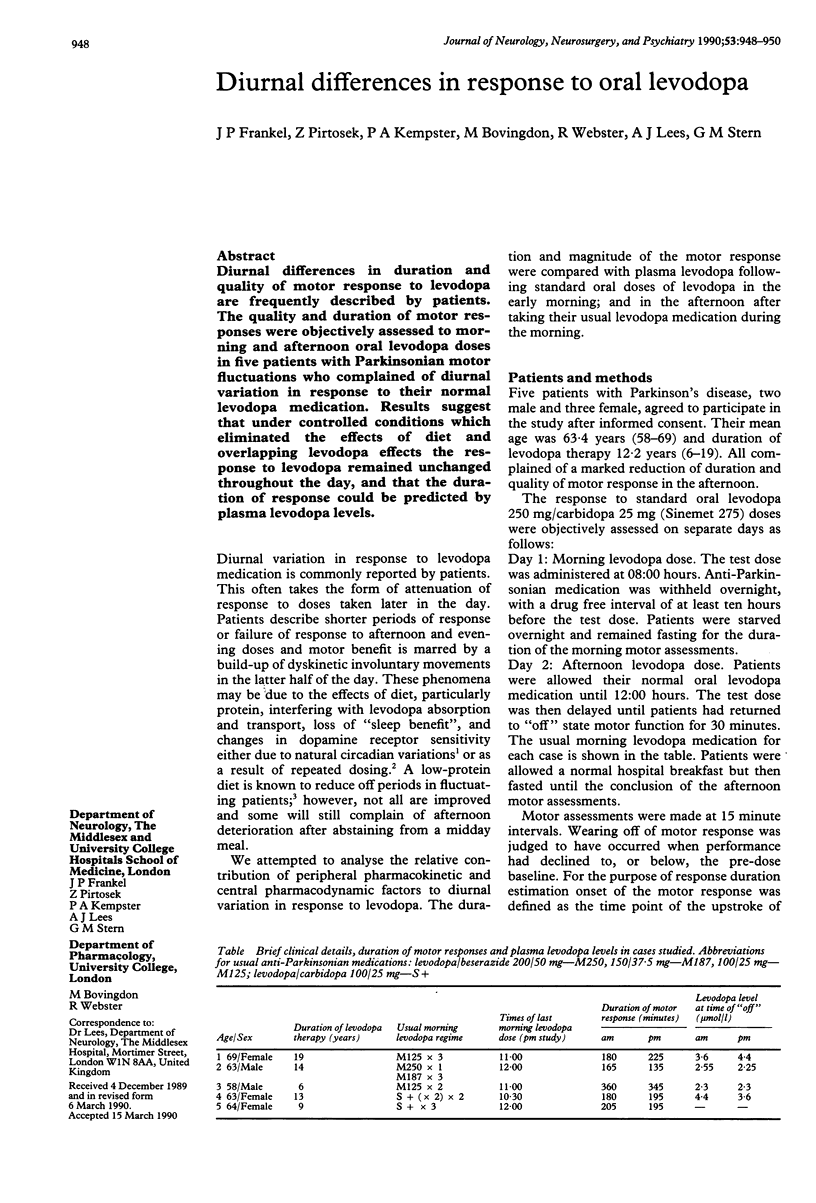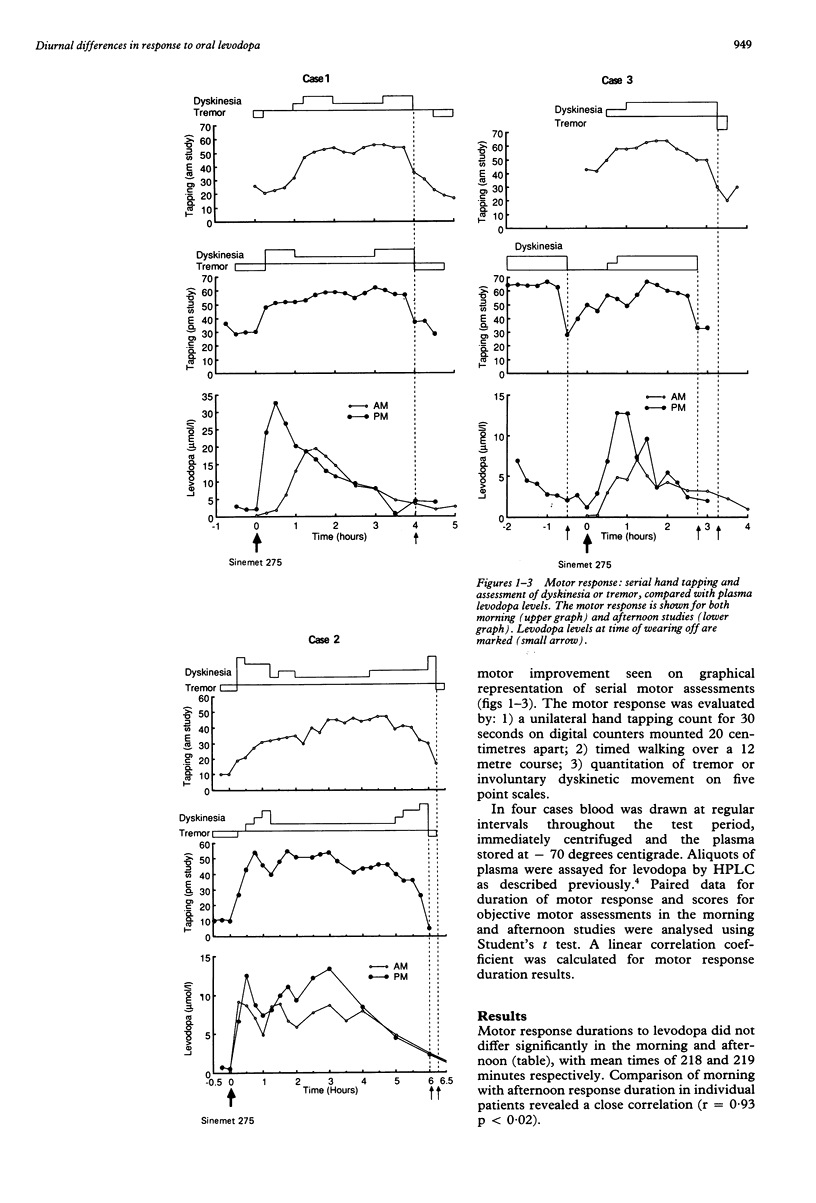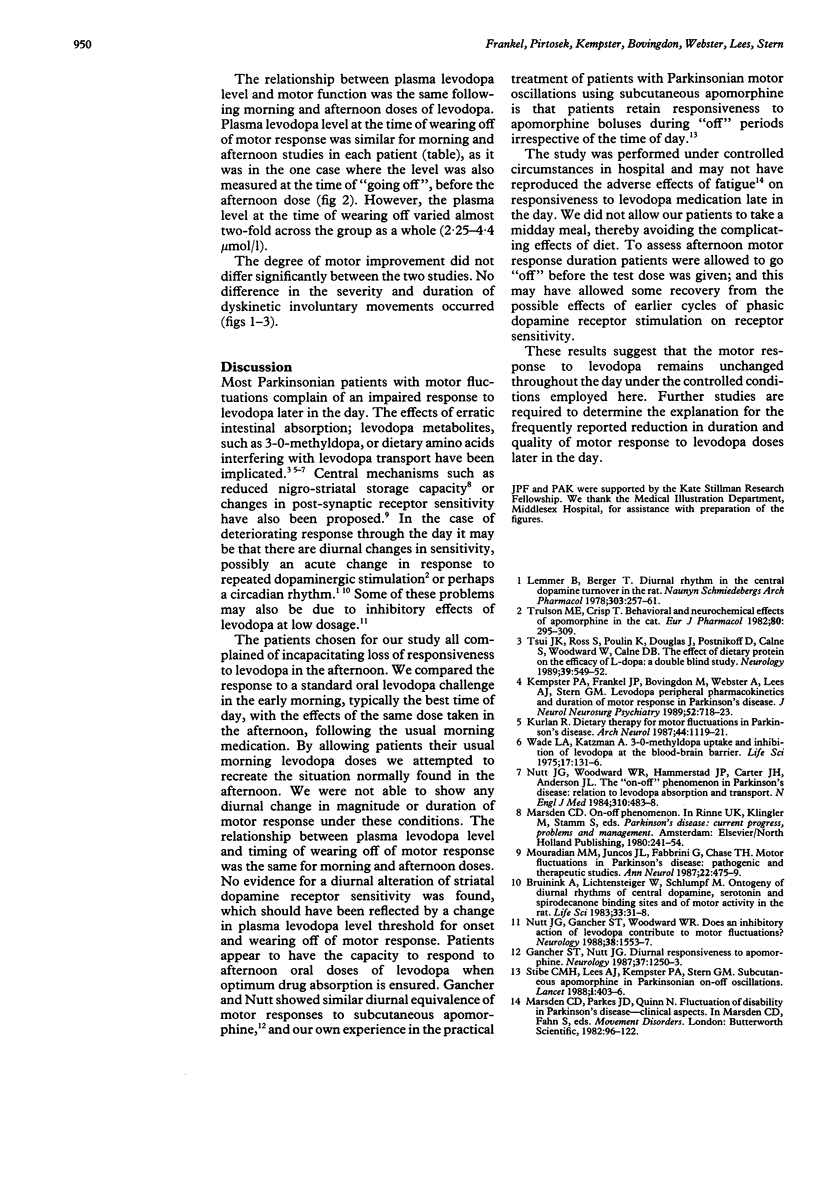Abstract
Diurnal differences in duration and quality of motor response to levodopa are frequently described by patients. The quality and duration of motor responses were objectively assessed to morning and afternoon oral levodopa doses in five patients with Parkinsonian motor fluctuations who complained of diurnal variation in response to their normal levodopa medication. Results suggest that under controlled conditions which eliminated the effects of diet and overlapping levodopa effects the response to levodopa remained unchanged throughout the day, and that the duration of response could be predicted by plasma levodopa levels.
Full text
PDF


Selected References
These references are in PubMed. This may not be the complete list of references from this article.
- Bruinink A., Lichtensteiger W., Schlumpf M. Ontogeny of diurnal rhythms of central dopamine, serotonin and spirodecanone binding sites and of motor activity in the rat. Life Sci. 1983 Jul 4;33(1):31–38. doi: 10.1016/0024-3205(83)90708-7. [DOI] [PubMed] [Google Scholar]
- Gancher S. T., Nutt J. G. Diurnal responsiveness to apomorphine. Neurology. 1987 Jul;37(7):1250–1253. doi: 10.1212/wnl.37.7.1250. [DOI] [PubMed] [Google Scholar]
- Kempster P. A., Frankel J. P., Bovingdon M., Webster R., Lees A. J., Stern G. M. Levodopa peripheral pharmacokinetics and duration of motor response in Parkinson's disease. J Neurol Neurosurg Psychiatry. 1989 Jun;52(6):718–723. doi: 10.1136/jnnp.52.6.718. [DOI] [PMC free article] [PubMed] [Google Scholar]
- Kurlan R. Dietary therapy for motor fluctuations in Parkinson's disease. Arch Neurol. 1987 Nov;44(11):1119–1121. doi: 10.1001/archneur.1987.00520230009005. [DOI] [PubMed] [Google Scholar]
- Lemmer B., Berger T. Diurnal rhythm in the central dopamine turnover in the rat. Naunyn Schmiedebergs Arch Pharmacol. 1978 Jul;303(3):257–261. doi: 10.1007/BF00498052. [DOI] [PubMed] [Google Scholar]
- Mouradian M. M., Juncos J. L., Fabbrini G., Chase T. N. Motor fluctuations in Parkinson's disease: pathogenetic and therapeutic studies. Ann Neurol. 1987 Oct;22(4):475–479. doi: 10.1002/ana.410220406. [DOI] [PubMed] [Google Scholar]
- Nutt J. G., Gancher S. T., Woodward W. R. Does an inhibitory action of levodopa contribute to motor fluctuations? Neurology. 1988 Oct;38(10):1553–1557. doi: 10.1212/wnl.38.10.1553. [DOI] [PubMed] [Google Scholar]
- Nutt J. G., Woodward W. R., Hammerstad J. P., Carter J. H., Anderson J. L. The "on-off" phenomenon in Parkinson's disease. Relation to levodopa absorption and transport. N Engl J Med. 1984 Feb 23;310(8):483–488. doi: 10.1056/NEJM198402233100802. [DOI] [PubMed] [Google Scholar]
- Stibe C. M., Lees A. J., Kempster P. A., Stern G. M. Subcutaneous apomorphine in parkinsonian on-off oscillations. Lancet. 1988 Feb 20;1(8582):403–406. doi: 10.1016/s0140-6736(88)91193-2. [DOI] [PubMed] [Google Scholar]
- Trulson M. E., Crisp T. Behavioral and neurochemical effects of apomorphine in the cat. Eur J Pharmacol. 1982 Jun 4;80(4):295–309. doi: 10.1016/0014-2999(82)90074-7. [DOI] [PubMed] [Google Scholar]
- Tsui J. K., Ross S., Poulin K., Douglas J., Postnikoff D., Calne S., Woodward W., Calne D. B. The effect of dietary protein on the efficacy of L-dopa: a double-blind study. Neurology. 1989 Apr;39(4):549–552. doi: 10.1212/wnl.39.4.549. [DOI] [PubMed] [Google Scholar]
- Wade L. A., Katzman R. 3-O-methyldopa uptake and inhibition of L-dopa at the blood-brain barrier. Life Sci. 1975 Jul 1;17(1):131–136. doi: 10.1016/0024-3205(75)90248-9. [DOI] [PubMed] [Google Scholar]


